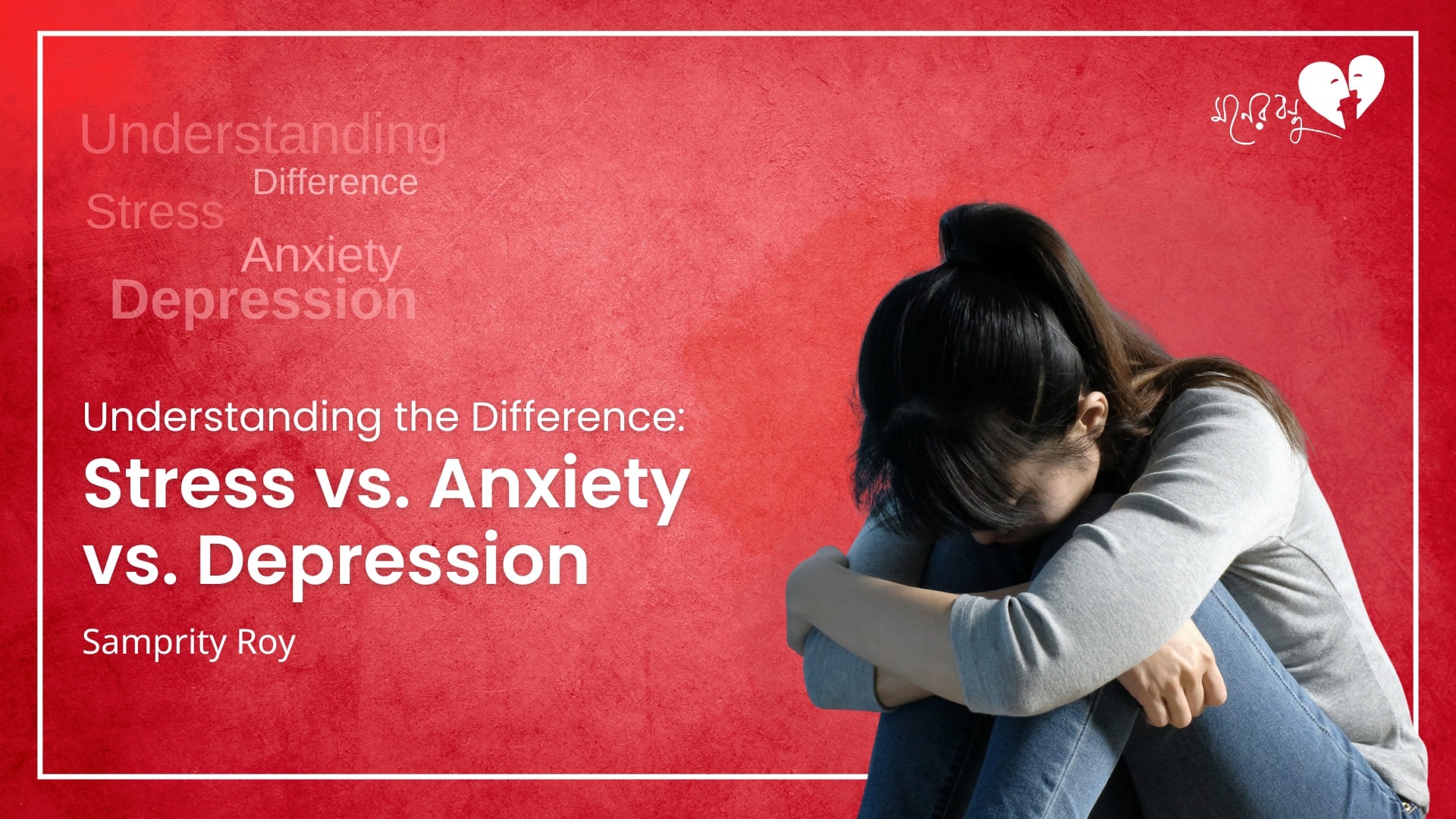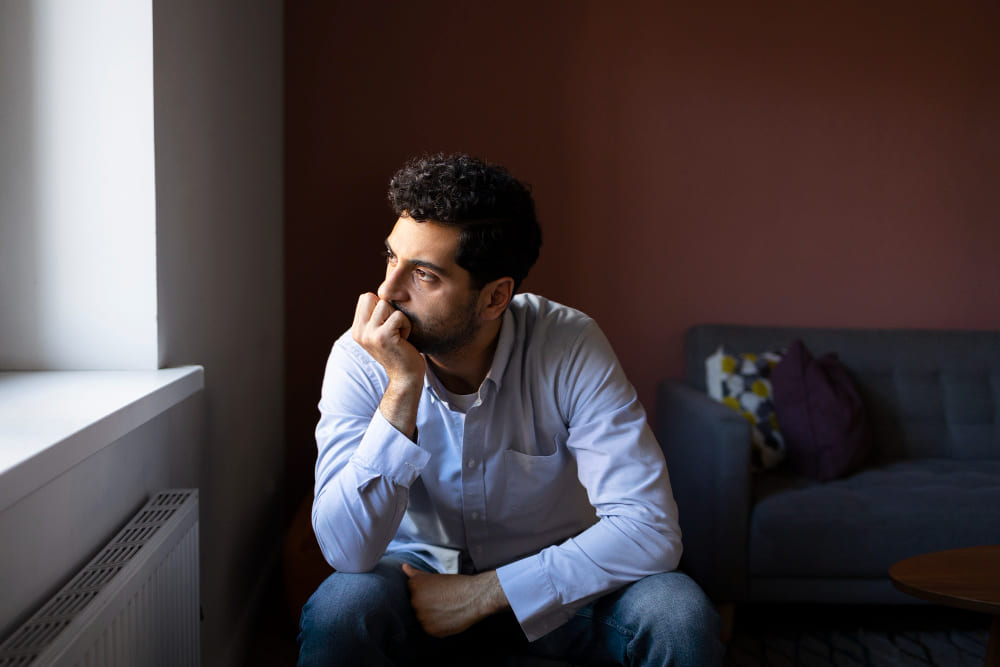
Samprity Roy
When someone says they are stressed, anxious, or feeling depressed, what usually comes to mind are the emotions themselves. These words have become common in everyday language—but do we truly understand what they mean?
Stress, anxiety, and depression are interconnected, but they are not the same. Failing to understand the differences can lead to ignoring symptoms, mislabeling emotions, or invalidating someone else’s experience. In this blog, we’ll break down what each term really means, how they differ, and when it might be time to seek support.

So,
What Is Stress?
Let’s start with stress—something we’re all familiar with. We often feel it before exams, during deadlines, in traffic jams, or when life simply becomes too overwhelming.
Stress is your body’s natural response to a challenge. It’s not always a bad thing—sometimes it motivates us to focus, act quickly, or be more productive. But when stress becomes chronic (lasting weeks or months), it can take a serious toll on your physical and emotional well-being.
Common symptoms of stress include:
• Body pain or tension, headaches
• Difficulty sleeping
• Racing thoughts or constant worry
• Trouble concentrating
According to Sebelnz (2014), stress often shows up as irritability or feeling easily overwhelmed.
The good news? Stress usually fades once the pressure is gone. A good night’s sleep, deep breathing, or simply talking to someone can sometimes ease it.
What Is Anxiety?
Anxiety goes beyond stress. Unlike stress, anxiety isn’t always tied to a specific situation—it can persist even after the problem is resolved. It’s the endless “what-ifs” that spiral in your mind, the feeling of unease without a clear reason, or the tight knot in your stomach even when everything seems fine.
Some anxiety is normal—like getting nervous before a presentation—but chronic or excessive anxiety can interfere with your daily life. At that point, it may indicate an anxiety disorder.
You may be experiencing anxiety if you:
• Worry excessively about future events
• Avoid situations due to fear or nervousness
• Feel constantly on edge or unsettled
• Have physical symptoms like a rapid heartbeat, shortness of breath, or dizziness
• Struggle to relax or sleep, even when exhausted
Fortunately, anxiety can be managed through therapy, breathing exercises, medication (when appropriate), and lifestyle changes such as mindfulness and regular physical activity.
What Is Depression?
Unlike stress or anxiety, depression doesn’t just go away on its own. It is a mood disorder that deeply affects how you think, feel, and function over time.
People often describe depression as a heavy fog, emotional numbness, or deep sadness they can’t shake. It’s not just a bad mood that lasts a day or two—it lingers and can make even the smallest tasks feel impossible.
Signs of depression include:
• Persistent low mood or emotional emptiness
• Loss of interest in activities you once enjoyed
• Feelings of hopelessness, worthlessness, or guilt
• Major changes in sleep or appetite
• Low motivation and constant fatigue
• Thoughts of self-harm or suicide
Depression is serious, but treatable. Recovery is possible through therapy, medication, and strong support systems.
Stress vs. Anxiety vs. Depression: Key Differences
While they often overlap, here’s a simple way to distinguish them:
• Stress is usually caused by external pressure and tends to be short-term.
• Anxiety is internal, often persistent, and may not have a clear cause.
• Depression is a long-term emotional condition that affects your thoughts, mood, energy, and motivation.
Understanding these distinctions isn’t just about using the right terms—it’s about responding appropriately. Becoming more aware—whether in yourself or in others—is the first step toward healing.
When Should You Seek Help?
Any feeling of being overwhelmed, anxious, or low that lasts more than two weeks—or that disrupts your studies, work, sleep, relationships, or motivation—deserves attention.
Start by opening up to someone you trust. But ideally, reach out to a licensed counselor or psychologist. These professionals can help you understand what you’re experiencing and guide you toward effective ways to cope.
You don’t have to wait until things get worse. Early intervention can make a huge difference.
Final Thoughts
Talking about mental health isn’t always easy, but understanding the differences between stress, anxiety, and depression is a step in the right direction. It helps us become more self-aware and more empathetic toward others.
You can face these challenges alone—but you don’t have to. Seeking help, whether from a counselor, therapist, or psychologist, is not a weakness. It’s an act of courage and self-care.
Your feelings are valid. Your mental health matters. And there is always support available.
ব্লগটি মনের বন্ধু এক্সপার্ট দ্বারা রিভিউয়ের পরে প্রকাশিতএই ব্লগের একমাত্র উদ্দেশ্য মানসিক স্বাস্থ্য বিষয়ক সচেতনতা বৃদ্ধি করা। পাঠকের বোঝার সুবিধার্থে এতে কিছু প্রতীকি ঘটনা ব্যবহার করা হয়েছে।
এই ব্লগ বা এর কোনো অংশ পড়ে কেউ আঘাতপ্রাপ্ত হলে তার জন্য লেখক ও ‘মনের বন্ধু’ দায়ী নয়। মনের ওপর চাপ অনুভব করলে বা মানসিকভাবে ট্রিগার্ড অনুভব করলে দ্রুত মনের বন্ধু বা যেকোনো মানসিক স্বাস্থ্যবিদের সাথে যোগাযোগ করুন।
মনের বন্ধুতে কাউন্সেলিং নিতে যোগাযোগ করুন: ০১৭৭৬৬৩২৩৪৪।
📍: ৮ম ও ৯ম তলা, ২/১৬, ব্লক-বি, লালমাটিয়া, ঢাকা

Mental stress is our emotional and psychological response when we feel overwhelmed, pressured, or threatened by challenging situations.

Though the era has moved on, the society of our country is still dark. I am saying this because almost all families in our country think “What is mental health again? What is depression?

In the bustling streets of Bangladesh, amidst the vibrant culture and rich traditions, lies a silent struggle that often goes unnoticed—the mental health challenges faced by Bangladeshi men. While the

ঘটনা ১ঃ দীর্ঘদিন সেমিস্টার ব্রেকের পর আবার ক্লাস শুরু হবে শায়লার (ছদ্মনাম)। ছুটিটা বেশ আনন্দেই কাটিয়েছে। কিন্তু বিপত্তি বাঁধলো ছুটির শেষ দিকে এসে। এক প্রবল অস্থিরতা পেয়ে বসলো তাকে। বিশ্ববিদ্যালয়, ক্লা